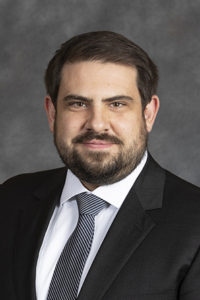Tax credits for caregivers, others created
Lawmakers approved a bill April 18 creating several new tax credits, including one to help Nebraskans offset expenses they incur when caring for a family member.

Under LB937, introduced by Lincoln Sen. Eliot Bostar, a family caregiver is eligible for a nonrefundable income tax credit equal to 50% of expenses incurred that are directly related to the care for and support of an eligible family member.
Total credits are limited to $1.5 million in fiscal year 2025-26 and FY2026-27 and $2.5 million in the following years.
As amended, LB937 contains provisions of several other bills heard by the Revenue Committee this session.
Under the provisions of LB901, introduced by Sen. Lou Ann Linehan of Elkhorn, purchases made by a nonprofit organization are exempt from state sales and use tax if the nonprofit acquires property or contracts to build, improve or repair property that will be transferred to a nonprofit whose purchases already are exempt.
The amended provisions of LB1002, sponsored by Plymouth Sen. Tom Brandt, set the maximum amount of tax credits available under the Nebraska Biodiesel Tax Credit Act at $1 million in FY2024-25 and $1.5 million in the following years.
Under the amended provisions of LB1022, introduced by Sen. Rita Sanders of Bellevue, film and television production companies may apply for a refundable income tax credit equal to at least 20% of their qualifying expenditures attributable to the production of films, documentaries and other projects in Nebraska.
The state Department of Economic Development could approve no more than $500,000 in credits in FY2025-26 and $1 million in the following years.
The amended provisions of LB1025, introduced by Bostar, create the Individuals with Intellectual and Developmental Disabilities Support Act.
The provisions allow qualifying direct support professionals who care for individuals with intellectual and developmental disabilities to claim a refundable state income tax credit.
Employers of direct support professionals can claim a new nonrefundable credit, as can employers that either employ an individual receiving services pursuant to a Medicaid home and community-based services waiver or provide certain services to an individual pursuant to such a waiver.
The state Department of Revenue may approve a total of $1 million in credits in FY2025-26, $1.5 million in FY2026-27 and $2 million in later years.
Under a bill passed last session, grocery stores, restaurants and agricultural producers may apply for a nonrefundable state income tax credit equal to 50% of the value of food they donate to food banks, pantries or rescues, up to a maximum of $2,500.
Under the provisions of LB1040, introduced by Omaha Sen. John Fredrickson, the department may approve $500,000 in credits each fiscal year beginning in FY2025-26.
The amended provisions of LB1072, sponsored by Sen. George Dungan of Lincoln, allow a producer or importer of sustainable aviation fuel to claim a nonrefundable income tax credit based on the number of gallons in all sold or used qualified mixtures. The department may approve $500,000 in credits each fiscal year.
Under the amended provisions of LB1084, introduced by Sumner Sen. Teresa Ibach, a Class III shortline rail company located wholly or partly in Nebraska can apply to the department for a nonrefundable tax credit equal to 50% of its qualified maintenance expenditures during the tax year.
The credit amount cannot exceed $1,500 per mile of track. The department may approve no more than $500,000 in credits in FY2025-26 and $1 million in later years.
Under the provisions of LB1158, sponsored by Bostar, the state treasurer will contract with a medical debt relief coordinator to purchase and discharge medical debt of eligible residents.
Nebraska residents with a household income at or below 400% of the federal poverty guidelines or with medical debt equal to at least 5% of the individual’s household income qualify. Contributions to the program’s fund are deductible for state income tax purposes.
Under the amended provisions of LB1184, introduced by Bostar, Nebraska taxpayers can apply to the department for a one-time, refundable state income tax credit of up to $1,000 to offset the cost of installing a reverse osmosis system at their primary residence if test results show high levels of nitrates, uranium or certain chemicals in the drinking water.
The department may approve a total of $500,000 in credits in FY2024-25 and the following two fiscal years and $1 million in later years.
The amended provisions of LB606, introduced last session by Sen. Joni Albrecht of Thurston, allows individuals, passthrough entities, corporations, estates and trusts to claim a nonrefundable credit of up to 50% of their state income tax liability on contributions they make to qualifying pregnancy help organizations.
Total credits are limited to $500,000 in FY2025-26 and $1 million in FY2026-27 and later years.
Provisions of Brandt’s LB1047 expand the list of denaturants subject to an excise tax paid by ethanol producers and impose the tax on 2% of certain agricultural ethyl alcohol sold that is unfit for beverage purposes.
Finally, provisions of LB58, introduced by Omaha Sen. John Cavanaugh, exempt diapers from state sales and use tax.
The department estimates that LB937 will reduce state general fund revenue by $1.2 million in fiscal year 2024-25, $6.7 million in FY2025-26 and $8.8 million in FY2026-27.
The bill passed on a vote of 45-0.

